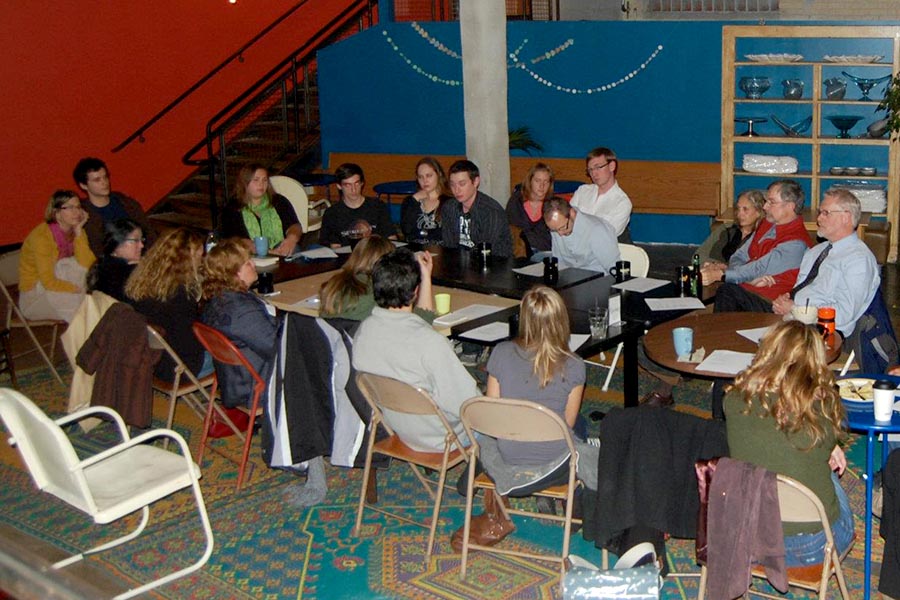Philosophers' Café
A Meeting of
Minds
Enjoy lively discussion with community members.
Held at local coffee shops and pubs, our cafés give you the chance to engage in open, friendly and respectful dialogue in a relaxed and informal setting with community members. We will discuss topics ranging from traditional philosophical problems, like truth and the liberty of thought and discussion to pressing contemporary issues, like refugees, climate change and the metaverse. Topics are introduced and discussions moderated by faculty from either St. Norbert College or UW-Green Bay.

Current Schedule
Wednesday, December 14
The Queen's Legacy: When is the Right Time to Talk about Colonialism?
- Location: 7:00 p.m. at St. Brendan's Inn
- Moderator: Kaden Paulson-Smith, Ph.D. (Democracy & Justice Studies, UW-Green Bay)
The passing of Queen Elizabeth II has sparked a global conversation about the legacies she left behind. To pay tribute to the Queen's 70-year reign, the United Kingdom shut down for 10 days of mourning, over a quarter-million people waited in a 10-mile queue, countless world leaders shared their condolences and a movement was reignited to #AbolishTheMonarchy. The British monarch serves as head of state not only in the UK, but in 14 other countries that inherited the monarchy from their time as British colonies, and this number doubles if you add overseas territories. However, the timing of the colonialism debate upset many who said this was not the right time to talk about it. What is the "appropriate" reaction to the Queen's death? What kind of legacies does she leave in her wake? When is the right time to talk about colonialism?
Wednesday, February 8
Defining and Understanding Our Sense of Place
- Location: 7:00 p.m. at St. Brendan's Inn
- Moderator: Kristopher Purzycki, Ph.D. (English & Humanities, UW-Green Bay)
Misunderstood yet charged with enormous significance, our understanding of place can help us begin to recognize the complexity and dynamism of our and others’ communities. Our discussion will draw from several disciplines – geography, philosophy, game studies and tourism for starters – to recognize how we make place through our relationships and activities. We’ll consider our own places of meaning as well as the potential for place to be a source of struggle and contention.
Wednesday, March 8
The Promise of Ecological Restoration
- Location: 7:00 p.m. at St. Brendan's Inn
- Moderator: Karen Stahlheber, Ph.D. (Natural & Applied Sciences, UW-Green Bay)
The late E.O. Wilson predicted that this century will be “the era of restoration in ecology.” We are living in an unprecedented era of biodiversity loss even as we depend more on the services we get from our planet. Restoration offers us the promise of regaining diversity and function where land has been degraded by pollution, intensive resource extraction or other human impacts. But are we able to deliver on that promise? What are the drawbacks of assuming we can restore healthy ecosystems in their original condition? What should the ongoing role of humans be in nature? Our discussion will consider whether restoration is imperative or impossible and what we mean when talk about the "original condition" of the land around us.
Wednesday, April 12
The Meaning in Life and the Meaning of Life
- Location: 7:00 p.m. at St. Brendan's Inn
- Moderator: Robert Riordan (Philosophy & Humanities, UW-Green Bay)
There are several reasons why the question of the meaning of life is not often discussed among professional philosophers. On the one hand, the question itself is rather vague; on the other hand, there is a consensus that unless someone is willing to embrace religious answers to the question, then there can be no meaning to life. However, over the last 20 years the question of the meaning of life has seen a resurgence of interest among philosophers who have sought to distinguish between the meaning of life and meaning in life and to explain how even if life as a whole is meaningless, individual lives can be meaningful. These efforts of explaining the meaningfulness of individual lives have raised other important questions: What makes a life meaningful? What sort of a thing meaningfulness is? And what is the connection between talk of life’s meaning as a whole and the meaning of individual lives?
Tuesday, May 9
Antigone: Between Civil Disobedience and the Law of Men
- Location: 7:00 p.m. at St. Brendan's Inn
- Moderator: Hernan Fernandez-Meardi (Modern Languages & Humanities, UW-Green Bay)
As George Stern clearly points out in the preface to his book Antigones: “Antigone is one of the enduring and canonical acts in the history of our philosophical, literary, political consciousness”. From the fifth century BC until now, the image of resistance against the abuse of power embodied by Antigone has not lost its validity. Since it is not just any resistance but a peaceful resistance, a resistance that assumes responsibility for its actions but is completely convinced of its genuine sense of responsibility and the legitimacy of its position. More recently Judith Butler updates the interpretation of Antigone focusing on the relationship between women and the state. In this discussion, we will try to reflect on the relevance of civil disobedience in a democracy, and on the role of women as an image of resistance to male hegemony.
Stay Up-to-Date
If you would like to receive announcements about upcoming café events, please subscribe to the email list.

Reach Out
Does God exist? Do we survive our bodily death? Does life have a meaning? What is the best life a person can lead? Is beauty in the eye of the beholder? Professor and department-chair Hye-Kyung Kim, is available to ponder your philosophical questions both great and small.